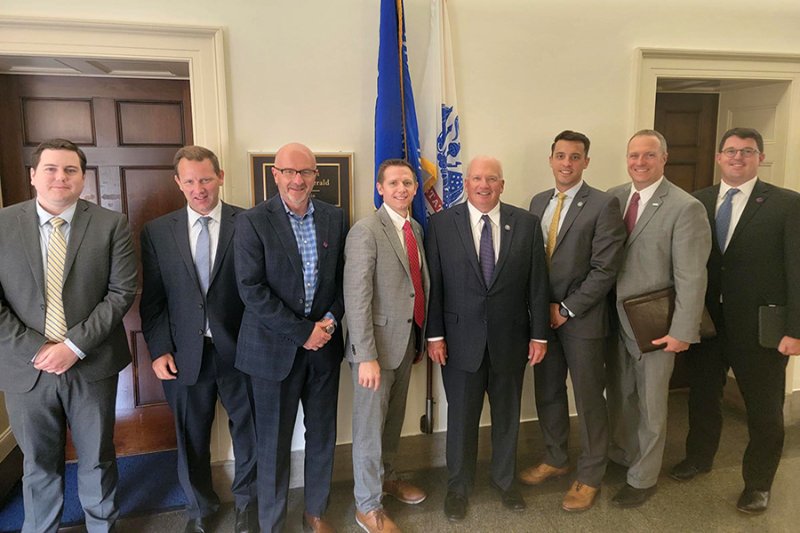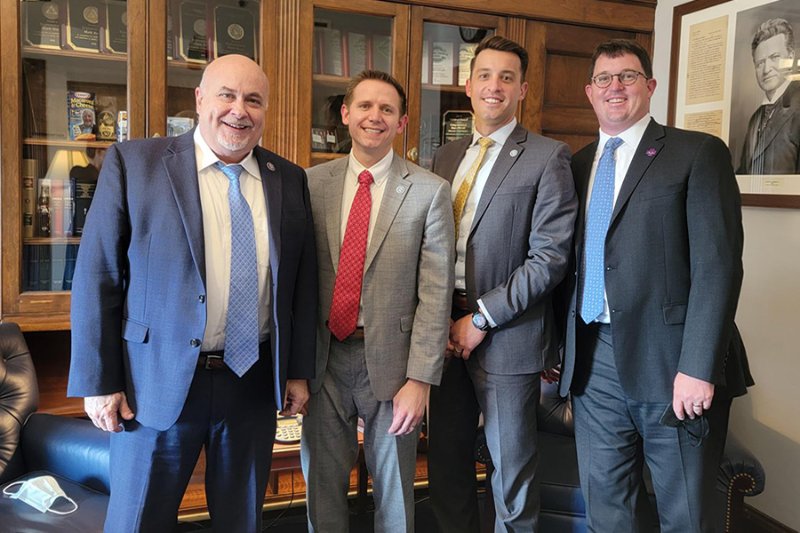Vol. 66, Issue 25
View more issues of The Valued Voice
Sign Up for WHA's Newsletter
Click here to view past issues
IN THIS ISSUE
- WHA Welcomes Member Hospital Representatives and Sponsors Back to In-Person Wisconsin Rural Health Conference
- In-Person Conference Brings Physician Leaders Together for the First Time in Three Years
- WHA Launches Online Health Care Glossary
- Agenda and Schedule Announced for WHA 2022 Post-Acute Care Conference
- WHA On Capitol Hill Urges Congress to Address Rural Hospital Issues and Extend Incentives for Value-Based Payments
- DHS Market Study of the Long-term Care Industry in Wisconsin Advances
- Supreme Court Decides Unanimously in Favor of 340B Hospitals
- WHA Expresses Concerns with Inadequate Payment Update in FY 2023 Inpatient Rule
- Treatment of Opioid Use Disorder (TOUD) Waiver Course
- Third Webinar on Reducing Readmissions Draws Statewide Participation
EDUCATION EVENTS
Jan. 6, 2026
Age-Friendly Webinar Series Featuring Advocate HealthJan. 14, 2026
Caring for Wisconsin’s Caregivers Well-Being First Champion Challenge for Credentialing KickoffJan. 28, 2026
2026 WHA Health Care Leadership AcademyClick here to view education event calendar
View more issues of The Valued Voice
Sign Up for WHA's Newsletter
Thursday, June 23, 2022
WHA On Capitol Hill Urges Congress to Address Rural Hospital Issues and Extend Incentives for Value-Based Payments
WHA was joined by hospital leaders from across Wisconsin for a visit to Capitol Hill on June 21. The group of health care advocates visited Wisconsin's congressional delegation to build support for fixing several rural health care issues and extending a key incentive for value-based payment reforms.
Participating in the Capitol Hill visits were Hayward Area Memorial Hospital & Water’s Edge CEO Luke Beirl, Advocate Aurora Health Director, Federal Government Affairs Anthony Curry, WHA Vice President of Federal and State Relations Jon Hoelter, Rural Wisconsin Health Cooperative Director of Advocacy Jeremy Levin, Marshfield Clinic Vice President of Physician and Advanced Practice Clinician Relations Scott Polenz and Marshfield Clinic Director, Federal Government Relations Brad Wolters.
The group of hospital leaders advocated for a number of rural issues including:
WHA is continuing to build support for these key programs that sustain rural health care and value-based payment models. Contact WHA vice president of Federal and State Relations Jon Hoelter with questions.
 WHA and hospital leaders meet with Congressman Scott Fitzgerald (fourth from right).
WHA and hospital leaders meet with Congressman Scott Fitzgerald (fourth from right).
 WHA and hospital leaders meet with Congressman Mark Pocan (pictured at left).
WHA and hospital leaders meet with Congressman Mark Pocan (pictured at left).
Participating in the Capitol Hill visits were Hayward Area Memorial Hospital & Water’s Edge CEO Luke Beirl, Advocate Aurora Health Director, Federal Government Affairs Anthony Curry, WHA Vice President of Federal and State Relations Jon Hoelter, Rural Wisconsin Health Cooperative Director of Advocacy Jeremy Levin, Marshfield Clinic Vice President of Physician and Advanced Practice Clinician Relations Scott Polenz and Marshfield Clinic Director, Federal Government Relations Brad Wolters.
The group of hospital leaders advocated for a number of rural issues including:
- Having Wisconsin's Congressional Delegation urge HRSA to pause planned actions to remove up to 47 areas of Wisconsin from the list of designated health professional shortage areas. This action would jeopardize access to tools that sustain rural care, such as enhanced Medicare/Medicaid payments, access to the Conrad-30 J-1 VISA waiver program, and loan repayment.
- Cosponsoring the Rural Health Fairness in Competition Act. This legislation would allow new provider-based Rural Health Clinics to receive cost-based reimbursement instead of the lower reimbursement rates instituted in the 2021 Consolidated Appropriations Act.
- Cosponsoring the Rural Hospitals Support Act. This legislation would extend the Medicare-Dependent and Low-Volume Hospital Adjustment designation for "tweener" rural hospitals that currently expire September 30, 2022. Without these designations, 17 Wisconsin hospitals could face cuts of up to $19 million annually.
WHA is continuing to build support for these key programs that sustain rural health care and value-based payment models. Contact WHA vice president of Federal and State Relations Jon Hoelter with questions.
 WHA and hospital leaders meet with Congressman Scott Fitzgerald (fourth from right).
WHA and hospital leaders meet with Congressman Scott Fitzgerald (fourth from right). WHA and hospital leaders meet with Congressman Mark Pocan (pictured at left).
WHA and hospital leaders meet with Congressman Mark Pocan (pictured at left). Vol. 66, Issue 25
Thursday, June 23, 2022
WHA On Capitol Hill Urges Congress to Address Rural Hospital Issues and Extend Incentives for Value-Based Payments
WHA was joined by hospital leaders from across Wisconsin for a visit to Capitol Hill on June 21. The group of health care advocates visited Wisconsin's congressional delegation to build support for fixing several rural health care issues and extending a key incentive for value-based payment reforms.
Participating in the Capitol Hill visits were Hayward Area Memorial Hospital & Water’s Edge CEO Luke Beirl, Advocate Aurora Health Director, Federal Government Affairs Anthony Curry, WHA Vice President of Federal and State Relations Jon Hoelter, Rural Wisconsin Health Cooperative Director of Advocacy Jeremy Levin, Marshfield Clinic Vice President of Physician and Advanced Practice Clinician Relations Scott Polenz and Marshfield Clinic Director, Federal Government Relations Brad Wolters.
The group of hospital leaders advocated for a number of rural issues including:
WHA is continuing to build support for these key programs that sustain rural health care and value-based payment models. Contact WHA vice president of Federal and State Relations Jon Hoelter with questions.
 WHA and hospital leaders meet with Congressman Scott Fitzgerald (fourth from right).
WHA and hospital leaders meet with Congressman Scott Fitzgerald (fourth from right).
 WHA and hospital leaders meet with Congressman Mark Pocan (pictured at left).
WHA and hospital leaders meet with Congressman Mark Pocan (pictured at left).
Participating in the Capitol Hill visits were Hayward Area Memorial Hospital & Water’s Edge CEO Luke Beirl, Advocate Aurora Health Director, Federal Government Affairs Anthony Curry, WHA Vice President of Federal and State Relations Jon Hoelter, Rural Wisconsin Health Cooperative Director of Advocacy Jeremy Levin, Marshfield Clinic Vice President of Physician and Advanced Practice Clinician Relations Scott Polenz and Marshfield Clinic Director, Federal Government Relations Brad Wolters.
The group of hospital leaders advocated for a number of rural issues including:
- Having Wisconsin's Congressional Delegation urge HRSA to pause planned actions to remove up to 47 areas of Wisconsin from the list of designated health professional shortage areas. This action would jeopardize access to tools that sustain rural care, such as enhanced Medicare/Medicaid payments, access to the Conrad-30 J-1 VISA waiver program, and loan repayment.
- Cosponsoring the Rural Health Fairness in Competition Act. This legislation would allow new provider-based Rural Health Clinics to receive cost-based reimbursement instead of the lower reimbursement rates instituted in the 2021 Consolidated Appropriations Act.
- Cosponsoring the Rural Hospitals Support Act. This legislation would extend the Medicare-Dependent and Low-Volume Hospital Adjustment designation for "tweener" rural hospitals that currently expire September 30, 2022. Without these designations, 17 Wisconsin hospitals could face cuts of up to $19 million annually.
WHA is continuing to build support for these key programs that sustain rural health care and value-based payment models. Contact WHA vice president of Federal and State Relations Jon Hoelter with questions.
 WHA and hospital leaders meet with Congressman Scott Fitzgerald (fourth from right).
WHA and hospital leaders meet with Congressman Scott Fitzgerald (fourth from right). WHA and hospital leaders meet with Congressman Mark Pocan (pictured at left).
WHA and hospital leaders meet with Congressman Mark Pocan (pictured at left). IN THIS ISSUE
- WHA Welcomes Member Hospital Representatives and Sponsors Back to In-Person Wisconsin Rural Health Conference
- In-Person Conference Brings Physician Leaders Together for the First Time in Three Years
- WHA Launches Online Health Care Glossary
- Agenda and Schedule Announced for WHA 2022 Post-Acute Care Conference
- WHA On Capitol Hill Urges Congress to Address Rural Hospital Issues and Extend Incentives for Value-Based Payments
- DHS Market Study of the Long-term Care Industry in Wisconsin Advances
- Supreme Court Decides Unanimously in Favor of 340B Hospitals
- WHA Expresses Concerns with Inadequate Payment Update in FY 2023 Inpatient Rule
- Treatment of Opioid Use Disorder (TOUD) Waiver Course
- Third Webinar on Reducing Readmissions Draws Statewide Participation

